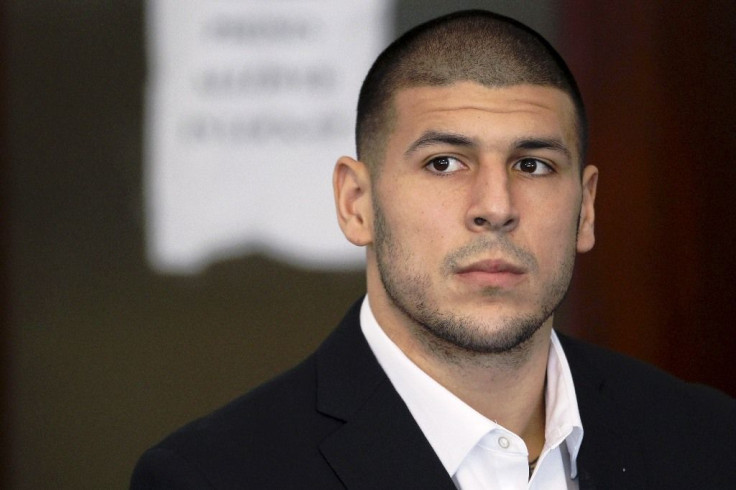Aaron Hernandez Murder: New Bill Would Prevent Future Convictions From Being Overturned Posthumously

The centuries-old Massachusetts legal rule that vacated Aaron Hernandez’s murder conviction posthumously could be getting the axe, according to new reports. If the bill is passed into law, it could mean that Hernandez’s legal team will have been one of the last to successfully vacate a murder conviction by invoking the doctrine.
The doctrine, referred to as “abatement ab initio,” makes it possible for convictions to be overturned after an inmate’s death if the individual has not completed his or her appeals process. As the Associated Press reported Sunday, a bill for which the testimony is being heard Monday would aim to keep intact the criminal convictions of perpetrators after they die — whether or not their legal team has exhausted the appeals process.
Read: Aaron Hernandez's Fiancee Shayanna Jenkins Denies Rumors He Was Gay
The former New England Patriots star’s murder conviction was thrown out last month by Judge E. Susan Garsh, who presided over his murder trial for the 2013 killing of Odin Lloyd. Judge Garsh said at the time that the court was “compelled to follow binding precedent” in issuing the ruling.
“The longstanding rule is…abating the entire prosecuting as if it never happened,” Garsh said.
Rosanna Cavallari, a professor at Suffolk University, explained the premise of the doctrine to CNN in April before Hernandez’s conviction was overturned. “The idea is that if an appeal hasn’t happened, there’s a chance the conviction has an error in it,” she said. “Rather than have someone with that incomplete decision that they’re guilty, the state chooses instead to say the conviction is abated as if it had never happened.”
Read: Aaron Hernandez's Estate Reportedly Owes $93K In Unpaid Taxes
According to the AP, Bristol County District Attorney Thomas Quinn III said earlier this month that the Massachusetts legal doctrine was “archaic.” He added, “Despite the tragic ending to Aaron Hernandez's life, he should not reap the legal benefits of an antiquated rule.”
Hernandez died by suicide April 19 in his prison cell in at the Souza-Baranowski Correctional Center in Shirley, Massachusetts. Hernandez reportedly used a bed sheet to hang himself from the window of his maximum-security cell, which he inhabited by himself. The Massachusetts Department of Corrections said after Hernandez’s death that he was not considered a suicide risk.
Just days before his death, Hernandez was acquitted of a double homicide for the 2012 murder of Daniel Abreu and Safiro Furtado. At the time of his death, the one-time star athlete was serving a life sentence for the 2013 Lloyd murder.
Hernandez’s attorney Jose Baez — who represented him during the double-murder trial — questioned the nature of the death and said in a statement that there “were no conversations or correspondence from Aaron to his family or legal team that would have indicated anything like this was possible.” In an interview with ESPN published the day before Hernandez’s suicide, Baez said the former tight end’s legal team was looking forward to appealing the Lloyd murder conviction.
© Copyright IBTimes 2024. All rights reserved.





















